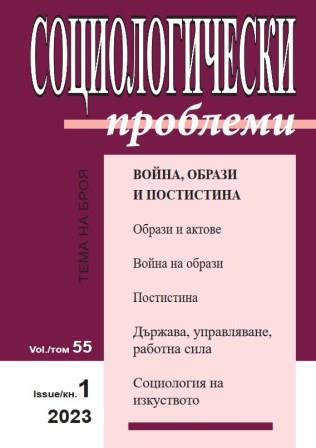Войната на огледалните образи
The War of the Mirrors Images
Author(s): Andrei BundzhulovSubject(s): Social Sciences, Sociology, Sociology of Culture, Sociology of Politics
Published by: Институт по философия и социология при БАН
Keywords: socialist heterotopia; total war; logic of the mirror image; geopolitical and historical imagination
Summary/Abstract: The paper examines the (technically reproducible) „atrocious image“ within discourses commenting on the tendency of such visuals to affect the viewers’ imagination and memory and their ability to make sense of and retain in their minds (representations of) „exceptional events“ such as war. The text analyses the theoretical circumstance that the affective potential of the „atrocious“ gives rise to many „iconoclastic“ debates about the ethical risk involved in the production, dissemination and consumption of technical images representing „transgressive moments“ – those „imagining“ death, torture and all manner of other ‘atrocities’. The aim is to discern what these debates miss, namely that the locus of misunderstanding is conditioned by the premise that photography and cinema have a disproportionate (compared to other media) power over people’s imaginations, and thus over the social as such. This power is tied to the uses of and prejudices about the apparent ability of a medium in a particular historical period to capture the truth of events and reality in general. In this sense, the article attempts to show that as contemporary audiovisual culture changes, the boundaries of old arguments about the affective potential of technical images must be reconsidered, as they have begun to lose their power and verisimilitude because they are easily falsifiable and increasingly function as a form „image speech“ for private individuals.The key idea of this article is the understanding that in the contemporary societies of supermodern capitalism of singularities and virtual effects, historical and geopolitical images play a substantial role in the transformations of power situations both within the separate state formations and on the regional and global scale, mediating the power transformations themselves towards new kinds of authoritarianism and totalitarianism. Historical and geopolitical imaginations, however, despite being closely related, should be distinguished as forms of social imagination working at different levels – the levels of independent and dependent, individual and collective consciousness, respectively the biographical and the historical unconscious in the translations-transitions from private to public form, reminiscent of the work of dreams. Today, more than three decades after the fall of the Berlin Wall (and of socialist heterotopia), a new Iron Curtain seems to be coming down, the spectres of the Cold War seem to return. And seemingly familiar historical and geopolitical images invade from the past – but are they the same? Don’t they have quite a different role of hyper-precision weapons of mass destruction? The main thesis is this: the war in Ukraine, maybe like any other war, is mediated by mirror images constructing the identities of the warring sides. A war of mirror images. One in which they, the warring sides, without noticing or being aware of it, see in the enemy their own reversed image.
Journal: Социологически проблеми
- Issue Year: 55/2023
- Issue No: 1
- Page Range: 54-78
- Page Count: 25
- Language: Bulgarian
- Content File-PDF

